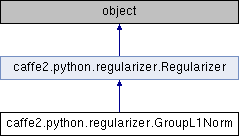Scardapane, Simone, et al. "Group sparse regularization for deep neural networks."
Neurocomputing 241 (2017): 81-89.
This regularizer computes l1 norm of a weight matrix based on groups.
There are essentially three stages in the computation:
1. Compute the l2 norm on all the members of each group
2. Scale each l2 norm by the size of each group
3. Compute the l1 norm of the scaled l2 norms
Definition at line 237 of file regularizer.py.
| def caffe2.python.regularizer.GroupL1Norm.__init__ |
( |
|
self, |
|
|
|
reg_lambda, |
|
|
|
groups, |
|
|
|
stabilizing_val = 0 |
|
) |
| |
Args:
reg_lambda: The weight of the regularization term.
groups: A list of integers describing the size of each group.
The length of the list is the number of groups.
Optional Args:
stabilizing_val: The computation of GroupL1Norm involves the Sqrt
operator. When values are small, its gradient can be numerically
unstable and causing gradient explosion. Adding this term to
stabilize gradient calculation. Recommended value of this term is
1e-8, but it depends on the specific scenarios. If the implementation
of the gradient operator of Sqrt has taken into stability into
consideration, this term won't be necessary.
Definition at line 248 of file regularizer.py.

 Public Member Functions inherited from caffe2.python.regularizer.Regularizer
Public Member Functions inherited from caffe2.python.regularizer.Regularizer Public Attributes inherited from caffe2.python.regularizer.Regularizer
Public Attributes inherited from caffe2.python.regularizer.Regularizer 1.8.11
1.8.11